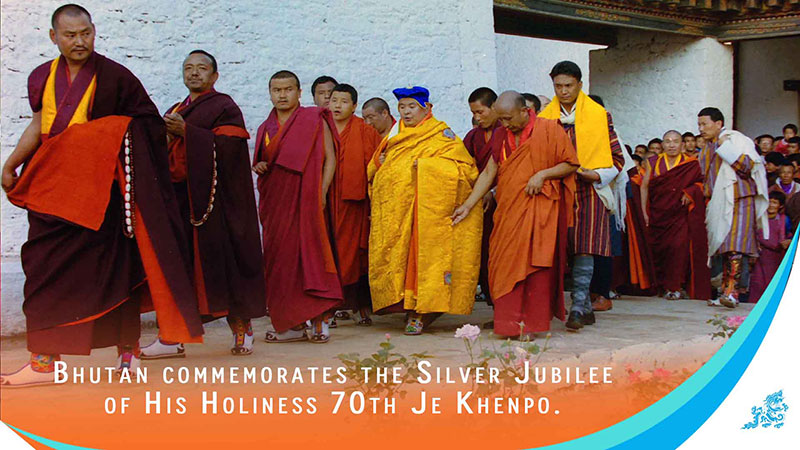Rinzin Wangchuk
As the nation today celebrates and commemorates the Silver Jubilee of His Holiness Trulku Jigme Chhoeda as the 70th Je Khenpo of Bhutan, religious institutions around the country are offering prayers and butter lamps for his long life.
Two special events are being organised by the Zhung Dratshang in Tashichhodzong and Punakha Dzong today to offer prayers and butter lamps and launch a book on His Holiness’ life and accomplishments. The dratshang will also release songs composed by His Holiness, according to a dratshang spokesman.
As a part of the commemoration, rabdey dratshangs in all dzongkhags are conducting a three-day Moenlam Chhenmo, the King of Aspiration Prayers, which concludes today with the offering of thousand butter lamps. His Holiness is also presiding over a Moenlam Chhenmo in Autsho, Lhuentse. “The special prayers are also being conducted to minimise and prevent from the disaster caused by Covid-19 pandemic,” the spokesperson said.
Considered one of the most accomplished spiritual masters, an ecclesiastical reformer and non-sectarian religious figures in modern Bhutan, His Holiness Trulku Jigme installed as the 70th Je Khenpo (Chief Abbot) on May 3, 1996, corresponding to the 15th day of the third Bhutanese month, became one of the youngest Chief Abbots.
His Holiness is the longest serving Je Khenpo of Bhutan after the first Je Khenpo, Pekar Jungney, who served for 21 years (1651-1672) as part of the Dual System of government established by Zhabdrung Ngawang Namgyel.
His Holiness the Je Khenpo has brought many changes within the clergy, strengthened and consolidated the teachings of the Dharma and the religious institutions by establishing monastic schools, shedras, drubdeys and meditation centres across the country.
One of His Holiness’s renowned reforms in the monastic body was doing away with serving meat during religious ceremonies held in dzongs and government-owned shedras, drubdeys, lobdras, and goendeys.
The February 2008 reform was replicated in villages during annual lochhoes (religious ceremonies) much to the appreciation of many Bhutanese.
Except for a piece of meat (tshogsha), which is indispensable for the Sangag (Mantric) rituals, all meals served in the religious institutions are vegetarian.
On the initiative of His Holiness the Je Khenpo, in 2002, Bhutan banned the sale of meat during auspicious days and months of the Bhutanese calendar to save animals.
Recognising the financial burden on the poor, His Holiness banned offering cash (Chhangep, Phuechha, Soeja and Soetsho) and other offerings to the clergy from the bereaved families during cremation ceremonies in July 2000. This has come as a huge relief to the rural population and the poorer sections of the society.
As an act of compassion, His Holiness saved thousands of animals from being slaughtered by butchers. He also banned abattoirs at Chamgang in Thimphu, Phuentsholing under Chukha and Ganguladrang in Mongar.
The dratshang under the leadership of His Holiness also instituted a small lobdra near the Thimphu cremation ground to conduct funeral rites. This helped the poor who cannot afford to conduct the post funeral rites.
Throughout his tenure as the Je Khenpo, His Holiness has been engaged in propagating the Buddha Dharma. There is no count of Moenlam Chenmos and oral transmissions, His Holiness conducted. Zhung Dratshang’s media spokesman Thukten Jamtsho said that His Holiness not only initiated the annual Moenlam Chhenmo in all dzongkhags but also contributed Nu 50.832M as seed money for future Moenlam Chhenmo.
His Holiness also contributed Nu 23.4M for the propagation of Buddha Dharma and development of infrastructure for religious institutions, monastic schools and monasteries. Hospitals also received donations like ambulances and ultrasound.
Recognising his lifetime service to the nation, His Majesty The King, on behalf of the people of Bhutan, conferred with the highest civilian decoration, Ngadag Pel Gi Khorlo (the Order of The Druk Gyalpo) to His Holiness the Je Khenpo on December 17, 2018 in Samtse.
His Holiness is a revered poet, composer of songs and music. His songs are holy hymns, praising the gods and the Dharma, capable of lifting one’s minds to a sublime state. They express gratitude for the past and felicitations for the present, while at the same time offering prayers for the future.
Following his birth on the morning of the fifth day of the seventh Bhutanese month in the Wood Sheep Year (August 22, 1955), His Holiness spent the first part of his life in the home of his parents father Rigzin Dorji and mother Kunzang Choden at Drubtse Goenpa in Kurtoe, the ancestral home of the Wangchuck dynasty.
As the young reincarnate Trulku had shown innate spiritual qualities and clairvoyant recollections of his previous life, his parents took him to see the Great Yogi Lama Sonam Zangpo in Bae Yul Khenpa Jong, in Lhuentse.
Lam Sonam Zangpo, who was the root teacher of the 67th Je Khenpo Nyizer Trulku, immediately recognised the young Trulku as the reincarnation of Geshey Pema Tshering, the learned sage of Tharpaling Goenpa in Bumthang who was the spiritual teacher of the second King, His Majesty Jigme Wangchuck.
At the age of six, His Holiness’ parents took him to Kalimpong in India where he received comprehensive blessings and empowerment of Rinchen Terzoed (the Precious Treasury of Termas) from His Holiness Dudjom Rinpoche Jigdrel Yeshey Dorji.
Trulku Jigme Choeda returned to Bhutan when he was eight years old in 1963. He then accompanied Lama Sonam Zangpo, with whom he resumed studies, on a pilgrimage to India. Eventually, he joined the Druk Sanga Choeling monastic institute and received the Getshul Dompa (basic ordination) and Wang Lung (initiation and transmission) from Drukpa Thugsey Rinpoche. There His Holiness began the study of ritual practices, recitations, and religious texts from Khenpo Sonam Dargye and Khenpo Noryang.
In 1965, at the age of 10, he received the Kangyur Lung (transmission of Buddha’s teachings) and Dudjom Terser (treasure teachings of Dudjom Rinpoche) in Darjeeling, India.
In 1970, at the age of 15, he returned to Bhutan and joined Tango Drubdey as a student of His Holiness the 68th Je Khenpo, Ngawang Tenzin Dhendrup.


